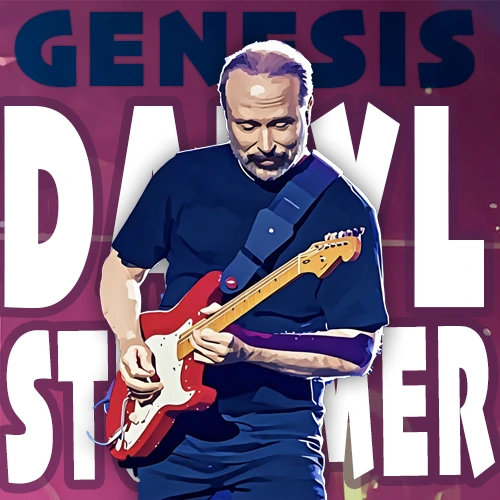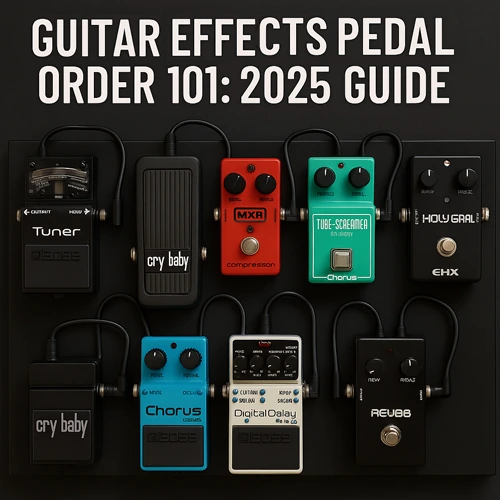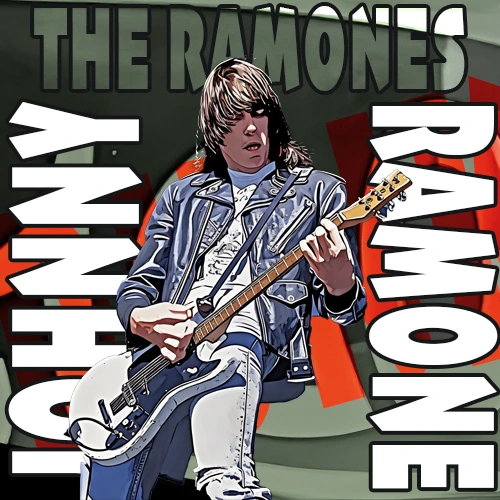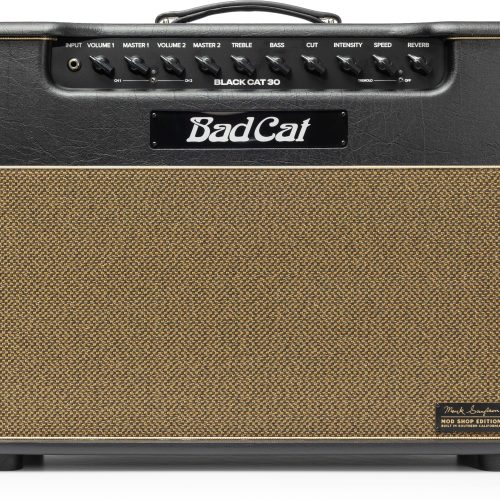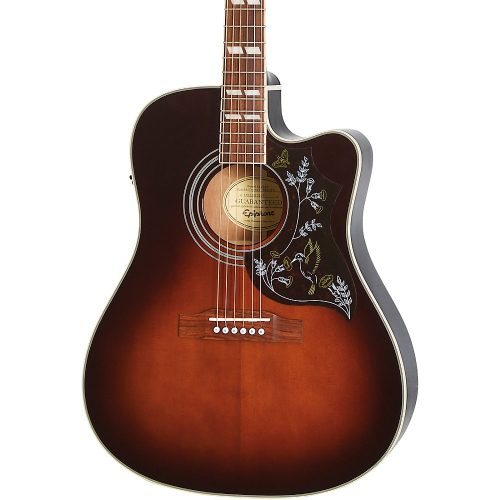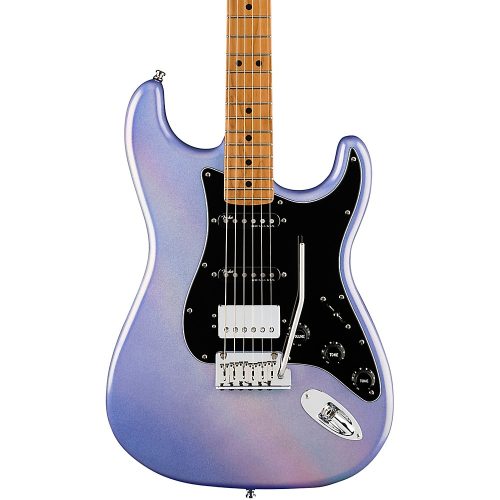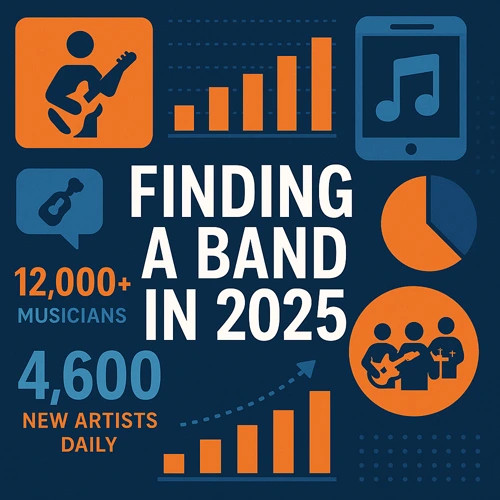
Table of Contents
Do you ever find yourself air-drumming to your favorite track and thinking, “Man, I need to be playing this with actual people, I need to find a band”? You’re not alone. Whether you’re a bedroom guitarist ready to step into the spotlight or a classically trained violinist itching to explore indie rock, the hunt for the perfect bandmates can feel like searching for that one guitar pick you dropped behind your amp—frustrating but totally worth it when you finally connect.
The music world has exploded with opportunity. Here’s a number that’ll blow your mind: 4,600 new artists get added to streaming platforms every single day, and roughly one-third of these are bands and groups. That means thousands of musicians are forming new collaborations daily, and you could be next.
But here’s the thing—finding bandmates in 2025 isn’t your dad’s garage band story anymore. Sure, you can still meet someone at a house party who happens to play bass, but smart musicians are using every tool available. From AI-powered matching apps to good old-fashioned coffee shop bulletin boards, the game has completely transformed.
12,000+ Musicians Can’t Be Wrong: The Digital Band Finder Revolution
The numbers don’t lie. Platforms like Mukken are seeing over 12,000 monthly active users with 80-120 new musicians joining every day. These aren’t just casual browsers—these are committed players actively seeking their musical soulmates.
BandMix: The Heavyweight Champion
Think of BandMix as the Amazon of musician classifieds. This platform has been connecting players for years, building a massive database that spans every genre from death metal to smooth jazz. The beauty lies in its hyper-local search capabilities—you can literally find a funk bassist three neighborhoods over.
Yeah, you’ll need to pay for full messaging features, but if you’re serious about your band search, it’s like buying quality cables—worth the investment for better connections.
Vampr: Where Musical Chemistry Meets Modern Tech
Vampr took the dating app concept and made it work for musicians. The swipe interface feels familiar, but instead of swiping right on someone’s beach photos, you’re connecting over shared obsessions with vintage Moogs and obscure time signatures.
Since getting acquired by Jaxsta in 2023, Vampr has grown beyond simple matchmaking. Now you can distribute music and track credits—perfect if you’re thinking beyond weekend jams toward actual career building.
PlayList: The Anti-Ghost Zone
Tired of messaging musicians who vanished into the digital ether? PlayList built their entire platform around active users. They actually purge inactive accounts, meaning 95% of members are genuinely looking for collaborators right now.
The platform feels more professional than typical band finder apps. Musicians upload full portfolios—tracks, videos, even résumés. If you’re in New York, California, or Texas, the user base is particularly strong.
Find a Band Through Social Media: Your Hidden Advantage
Facebook Groups: The Local Music Underground
Facebook might feel ancient compared to TikTok, but local musician groups are absolutely thriving. Search “[Your City] Musicians Network” and you’ll discover active communities where collaboration requests pop up weekly.
Here’s the secret sauce everyone misses: post a short video of yourself playing. Not a polished studio recording—just 30 seconds of you rocking that interesting chord progression or nailing a tricky vocal run. Visual proof beats a thousand words about your “tight rhythm section experience.”
Reddit: The Global Jam Session That Never Sleeps
Communities like r/FindABand and r/BandMembers connect musicians worldwide. Sure, you can’t filter by zip code, but these forums excel at matching players with specific artistic visions.
Reddit users appreciate authenticity and detail. Instead of “drummer seeks band,” try something like “Drummer influenced by Danny Carey and Matt Garstka seeking prog metal project with odd time signatures and conceptual lyrics.” That specificity attracts exactly the right weirdos—I mean, fellow artists.
HOT TIP: Local subreddit groups like r/BostonMusicians exist for location-specific searches, complementing global forums. So make sure to think about your local city Reddit threads which could be a game-changer.
Discord: Real-Time Musical Chemistry
Discord transformed from gaming chat to musician headquarters almost overnight. Servers like “We Are The Music Makers” host over 6,000 members sharing ideas, collaborating on tracks, and forming long-distance bands.
The killer feature? Voice channels for instant jamming. You can hop into a room, play with someone in another timezone, and know immediately if there’s musical chemistry worth pursuing further.
Find a Band the Old-School Way: Local Scene Networking
Open Mic Nights: Your Musical Speed Dating
Despite our hyper-connected world, open mic nights remain pure gold for finding bandmates. These events offer something no app can replicate—immediate musical chemistry and face-to-face energy reading.
The strategy goes beyond just performing. Stick around afterward. Compliment other players on specific things—their tone, their song choice, their stage presence. Then casually mention you’re looking to collaborate. One regular open mic attendee shared this wisdom:
“Go regularly to become a known face… become a regular.”
Consistency proves you’re serious, and you’ll gradually meet everyone in your local scene.
Music Stores: The Analog Social Network
Your local guitar shop isn’t just for trying out pedals—it’s prime networking territory. Most stores maintain bulletin boards covered in “musicians wanted” flyers. Yeah, posting a physical flyer seems prehistoric, but consider this: U2 formed through a school bulletin board notice.
Strike up conversations with store employees too. These folks know everyone who comes through, from weekend warriors to touring professionals. They often hear about bands needing members before anyone posts online.
Rehearsal Studios: Where Serious Musicians Gather
Rehearsal spaces are goldmines for finding committed players. These aren’t casual hobbyists—these are musicians serious enough to pay hourly rates for practice time.
Many studios host networking events or open jams for members. Even without formal events, hanging around during busy hours leads to natural conversations with bands between sessions. Check the walls for “musicians wanted” ads—these spaces often look like musical classified sections.
Remote Collaboration: Find a Band Without Leaving Your Bedroom
Technology has demolished geographic barriers for band formation. Musicians are creating full albums with collaborators they’ve never met in person, thanks to specialized platforms designed for remote music-making.
IndaBand: The Virtual Recording Studio
IndaBand lets musicians build songs layer by layer with contributors worldwide. You might start a track in your home studio, then have a bassist in Seattle add their part, followed by a drummer in Nashville. The platform handles file sharing, version control, and even helps split publishing credits.
With over 100,000 musicians across 170+ countries, IndaBand proves that great bands don’t need to share zip codes anymore.
Jamulus: Real-Time Jamming Across Distances
Jamulus enables low-latency online jamming that feels almost like being in the same room. Musicians connect directly through servers, minimizing delay for natural-feeling group performances.
The platform works best with solid internet connections and audio interfaces, but the results can be magical—full band rehearsals with members scattered across continents.
Soundtrap: Collaborative Creation Made Simple
Soundtrap combines multitrack recording with social features, letting musicians collaborate on songs from anywhere. The browser-based platform handles everything from initial songwriting to final mixing, with built-in chat and sharing tools.
Perfect for bands that write collaboratively—one member might lay down a basic chord progression, another adds melody, and a third contributes lyrics, all without leaving their respective home studios.
Professional Tips from Musicians Who’ve Been There
Define Your Musical Mission First
Before starting your band search, get crystal clear on your goals. Weekend hobby band? Serious gigging act? Touring aspirations? Recording-focused project?
This clarity prevents the classic mismatch where one member dreams of arena shows while another wants casual coffee shop performances. Successful bands align on purpose from day one.
Value Reliability Over Talent
The most technically gifted player isn’t always the best bandmate. A solid rhythm guitarist who shows up prepared beats a virtuoso who flakes on rehearsals every time.
Look for players who communicate well, respect others’ ideas, and contribute positive energy. The best bands grow together through trust and mutual support, not individual showboating.
Network Beyond Just Musicians
Don’t limit connections to other players. Venue owners, audio engineers, and music instructors often know available musicians seeking new projects. These industry connections can provide valuable insights about a potential bandmate’s reputation too.
Building relationships with scene veterans also opens doors for gigs, recording opportunities, and professional development beyond just finding bandmates.
Platform Comparison Chart
| Platform | Best For | User Base | Key Features | Cost |
|---|---|---|---|---|
| BandMix | Local searches | Thousands nationwide | Genre filters, detailed profiles | Free browsing, paid messaging |
| Vampr | Professional networking | Huge North American base | Swipe interface, career tools | Freemium model |
| PlayList | Active users | Strong in NY, CA, TX | Quality control, portfolios | Free with premium options |
| IndaBand | Remote collaboration | 100k+ globally | Layer-by-layer recording | Free basic, paid pro features |
| Discord | Real-time connection | Varies by server | Voice chat, instant messaging | Free |
| Facebook Groups | Local community | Hundreds per city | Video posts, event sharing | Free |
Overcoming Band Search Challenges
The Digital Ghost Problem
Online platforms suffer from inactive profiles and flaky users. Combat this by using multiple platforms simultaneously and looking for recent activity indicators.
When creating your own posts, include audio or video samples. Serious musicians respond to evidence of commitment, while casual browsers often ignore detailed posts.
Skill Level Mismatches
Honesty about your abilities saves everyone time. Beginners should embrace learning-focused communities, while experienced players can specify their expectations upfront.
Consider mentoring passionate but less experienced musicians—enthusiasm often trumps technique, and motivated players improve rapidly with band experience.
Genre Compatibility Issues
With music splintering into countless subgenres, finding players who share your specific vision requires laser-focused searching. Use detailed genre tags and reference specific artists in your descriptions.
Instead of “seeking guitarist,” try “seeking guitarist into post-hardcore with Thrice and Deftones influences.” Specificity attracts the right collaborators while filtering out poor matches.
Music Schools, Classes, and Workshops: Your Musical Classroom Connections
If you’re open to learning while networking, join a group class. Group music lessons or workshops are ideal meeting grounds for like-minded players.
You could enroll in an adult rock band class at a community music school, a songwriting workshop, or even a weekend recording clinic. The fellow students are literally musicians actively improving their craft—often they’d love to form a band for extra fun.
A Personal Note from the Get My Guitar Founders: Many moons ago, Get My Guitar founders David and Elliot met and started their band at music college—but not some expensive posh one. This was community college! Yeah, go figure! At that time the internet was just starting and we had zero of the resources available today. So, we kept an eye out on the papers and that’s how we found the local college was going to begin a 2-year music course. The lesson here is to also keep an eye on classified ads in papers and magazines because you never know what you might find! These “old school” methods can still work, so never count anything out.
Find a Band FAQ
Q: How long does it typically take to find good bandmates? A: It varies wildly. Some musicians connect immediately through local scenes, while others search for months. The key is consistency—keep networking, posting, and attending events. Most successful band formations happen within 3-6 months of active searching.
Q: Should I join an existing band or start my own? A: Both approaches work. Joining existing bands gets you playing faster, but starting fresh gives you more creative control. Consider your goals, experience level, and local opportunities when deciding.
Q: What’s the best age range for finding bandmates? A: Musical compatibility matters more than age. That said, similar life stages often work better—college students have different schedules than working parents. Be open to age diversity while considering practical logistics.
Q: How do I know if a potential bandmate is reliable? A: Look for signs: prompt communication, showing up prepared to auditions, having their own gear and transportation. Ask about their previous band experiences and why those ended.
Q: Is it worth paying for premium features on band finder apps? A: If you’re actively searching and using the platform regularly, premium features often pay off through better matching and communication tools. Start with free versions to test platform fit first.
Q: What should I include in my musician profile? A: High-quality audio/video samples, specific genre influences, availability and commitment level, your goals (casual vs. serious), and what you bring to a band beyond just your instrument.
Q: How do I handle auditions professionally? A: Treat them like job interviews—arrive on time, come prepared with agreed-upon material, communicate clearly about expectations, and follow up promptly. Remember, you’re evaluating them too.
Q: What red flags should I watch for when meeting potential bandmates? A: Consistent lateness, negative attitudes about previous collaborators, unwillingness to compromise on creative decisions, unrealistic expectations about success, or poor communication skills.
Find a Band in 2025 – Final Feedback
Finding your ideal bandmates in 2025 combines digital efficiency with old-school relationship building. Musicians are leveraging everything from AI-powered matching to coffee shop bulletin boards, often simultaneously.
The secret isn’t picking one perfect platform—it’s maintaining consistent effort across multiple channels while staying authentic to your musical vision. Your future bandmates might be scrolling through the same apps, attending the same open mics, or posting their own collaboration requests right now.
Dave Grohl put it perfectly:
“Get in the garage and just suck. Get your friends to come and they’ll suck too—and then you’ll start playing and have the best time… and all of a sudden you’ll become Nirvana.”
Every legendary band started with that first awkward rehearsal. Focus on finding people who share your enthusiasm for creating something bigger than individual contributions. Whether you connect through a cutting-edge app or strike up a conversation at your local music store, 2025 offers more opportunities than ever to find your musical tribe.
The only question left is: what are you waiting for? Your next bandmate could be one swipe, one open mic, or one “musicians wanted” post away.
👉 Check out more deals and gear reviews on the Get My Guitar Blog.
👉 Join our guitarist community to share your finds and discuss all things guitar!
👉 Check out the very latest Guitar News.
Disclosure: This post contains affiliate links. If you purchase through these links, we may earn a commission at no extra cost to you.
Recent Posts
Imagine this: it's 1980, and after a Genesis rehearsal, Phil Collins offers a Milwaukee guitarist a ride back into [...]
Ever wonder why your pedalboard sounds like mud even though you've got quality gear? The answer usually comes down [...]
Do you ever find yourself air-drumming to your favorite track and thinking, "Man, I need to be playing this [...]
Blog Categories
Tags

Table of Contents
Do you ever find yourself air-drumming to your favorite track and thinking, “Man, I need to be playing this with actual people, I need to find a band”? You’re not alone. Whether you’re a bedroom guitarist ready to step into the spotlight or a classically trained violinist itching to explore indie rock, the hunt for the perfect bandmates can feel like searching for that one guitar pick you dropped behind your amp—frustrating but totally worth it when you finally connect.
The music world has exploded with opportunity. Here’s a number that’ll blow your mind: 4,600 new artists get added to streaming platforms every single day, and roughly one-third of these are bands and groups. That means thousands of musicians are forming new collaborations daily, and you could be next.
But here’s the thing—finding bandmates in 2025 isn’t your dad’s garage band story anymore. Sure, you can still meet someone at a house party who happens to play bass, but smart musicians are using every tool available. From AI-powered matching apps to good old-fashioned coffee shop bulletin boards, the game has completely transformed.
12,000+ Musicians Can’t Be Wrong: The Digital Band Finder Revolution
The numbers don’t lie. Platforms like Mukken are seeing over 12,000 monthly active users with 80-120 new musicians joining every day. These aren’t just casual browsers—these are committed players actively seeking their musical soulmates.
BandMix: The Heavyweight Champion
Think of BandMix as the Amazon of musician classifieds. This platform has been connecting players for years, building a massive database that spans every genre from death metal to smooth jazz. The beauty lies in its hyper-local search capabilities—you can literally find a funk bassist three neighborhoods over.
Yeah, you’ll need to pay for full messaging features, but if you’re serious about your band search, it’s like buying quality cables—worth the investment for better connections.
Vampr: Where Musical Chemistry Meets Modern Tech
Vampr took the dating app concept and made it work for musicians. The swipe interface feels familiar, but instead of swiping right on someone’s beach photos, you’re connecting over shared obsessions with vintage Moogs and obscure time signatures.
Since getting acquired by Jaxsta in 2023, Vampr has grown beyond simple matchmaking. Now you can distribute music and track credits—perfect if you’re thinking beyond weekend jams toward actual career building.
PlayList: The Anti-Ghost Zone
Tired of messaging musicians who vanished into the digital ether? PlayList built their entire platform around active users. They actually purge inactive accounts, meaning 95% of members are genuinely looking for collaborators right now.
The platform feels more professional than typical band finder apps. Musicians upload full portfolios—tracks, videos, even résumés. If you’re in New York, California, or Texas, the user base is particularly strong.
Find a Band Through Social Media: Your Hidden Advantage
Facebook Groups: The Local Music Underground
Facebook might feel ancient compared to TikTok, but local musician groups are absolutely thriving. Search “[Your City] Musicians Network” and you’ll discover active communities where collaboration requests pop up weekly.
Here’s the secret sauce everyone misses: post a short video of yourself playing. Not a polished studio recording—just 30 seconds of you rocking that interesting chord progression or nailing a tricky vocal run. Visual proof beats a thousand words about your “tight rhythm section experience.”
Reddit: The Global Jam Session That Never Sleeps
Communities like r/FindABand and r/BandMembers connect musicians worldwide. Sure, you can’t filter by zip code, but these forums excel at matching players with specific artistic visions.
Reddit users appreciate authenticity and detail. Instead of “drummer seeks band,” try something like “Drummer influenced by Danny Carey and Matt Garstka seeking prog metal project with odd time signatures and conceptual lyrics.” That specificity attracts exactly the right weirdos—I mean, fellow artists.
HOT TIP: Local subreddit groups like r/BostonMusicians exist for location-specific searches, complementing global forums. So make sure to think about your local city Reddit threads which could be a game-changer.
Discord: Real-Time Musical Chemistry
Discord transformed from gaming chat to musician headquarters almost overnight. Servers like “We Are The Music Makers” host over 6,000 members sharing ideas, collaborating on tracks, and forming long-distance bands.
The killer feature? Voice channels for instant jamming. You can hop into a room, play with someone in another timezone, and know immediately if there’s musical chemistry worth pursuing further.
Find a Band the Old-School Way: Local Scene Networking
Open Mic Nights: Your Musical Speed Dating
Despite our hyper-connected world, open mic nights remain pure gold for finding bandmates. These events offer something no app can replicate—immediate musical chemistry and face-to-face energy reading.
The strategy goes beyond just performing. Stick around afterward. Compliment other players on specific things—their tone, their song choice, their stage presence. Then casually mention you’re looking to collaborate. One regular open mic attendee shared this wisdom:
“Go regularly to become a known face… become a regular.”
Consistency proves you’re serious, and you’ll gradually meet everyone in your local scene.
Music Stores: The Analog Social Network
Your local guitar shop isn’t just for trying out pedals—it’s prime networking territory. Most stores maintain bulletin boards covered in “musicians wanted” flyers. Yeah, posting a physical flyer seems prehistoric, but consider this: U2 formed through a school bulletin board notice.
Strike up conversations with store employees too. These folks know everyone who comes through, from weekend warriors to touring professionals. They often hear about bands needing members before anyone posts online.
Rehearsal Studios: Where Serious Musicians Gather
Rehearsal spaces are goldmines for finding committed players. These aren’t casual hobbyists—these are musicians serious enough to pay hourly rates for practice time.
Many studios host networking events or open jams for members. Even without formal events, hanging around during busy hours leads to natural conversations with bands between sessions. Check the walls for “musicians wanted” ads—these spaces often look like musical classified sections.
Remote Collaboration: Find a Band Without Leaving Your Bedroom
Technology has demolished geographic barriers for band formation. Musicians are creating full albums with collaborators they’ve never met in person, thanks to specialized platforms designed for remote music-making.
IndaBand: The Virtual Recording Studio
IndaBand lets musicians build songs layer by layer with contributors worldwide. You might start a track in your home studio, then have a bassist in Seattle add their part, followed by a drummer in Nashville. The platform handles file sharing, version control, and even helps split publishing credits.
With over 100,000 musicians across 170+ countries, IndaBand proves that great bands don’t need to share zip codes anymore.
Jamulus: Real-Time Jamming Across Distances
Jamulus enables low-latency online jamming that feels almost like being in the same room. Musicians connect directly through servers, minimizing delay for natural-feeling group performances.
The platform works best with solid internet connections and audio interfaces, but the results can be magical—full band rehearsals with members scattered across continents.
Soundtrap: Collaborative Creation Made Simple
Soundtrap combines multitrack recording with social features, letting musicians collaborate on songs from anywhere. The browser-based platform handles everything from initial songwriting to final mixing, with built-in chat and sharing tools.
Perfect for bands that write collaboratively—one member might lay down a basic chord progression, another adds melody, and a third contributes lyrics, all without leaving their respective home studios.
Professional Tips from Musicians Who’ve Been There
Define Your Musical Mission First
Before starting your band search, get crystal clear on your goals. Weekend hobby band? Serious gigging act? Touring aspirations? Recording-focused project?
This clarity prevents the classic mismatch where one member dreams of arena shows while another wants casual coffee shop performances. Successful bands align on purpose from day one.
Value Reliability Over Talent
The most technically gifted player isn’t always the best bandmate. A solid rhythm guitarist who shows up prepared beats a virtuoso who flakes on rehearsals every time.
Look for players who communicate well, respect others’ ideas, and contribute positive energy. The best bands grow together through trust and mutual support, not individual showboating.
Network Beyond Just Musicians
Don’t limit connections to other players. Venue owners, audio engineers, and music instructors often know available musicians seeking new projects. These industry connections can provide valuable insights about a potential bandmate’s reputation too.
Building relationships with scene veterans also opens doors for gigs, recording opportunities, and professional development beyond just finding bandmates.
Platform Comparison Chart
| Platform | Best For | User Base | Key Features | Cost |
|---|---|---|---|---|
| BandMix | Local searches | Thousands nationwide | Genre filters, detailed profiles | Free browsing, paid messaging |
| Vampr | Professional networking | Huge North American base | Swipe interface, career tools | Freemium model |
| PlayList | Active users | Strong in NY, CA, TX | Quality control, portfolios | Free with premium options |
| IndaBand | Remote collaboration | 100k+ globally | Layer-by-layer recording | Free basic, paid pro features |
| Discord | Real-time connection | Varies by server | Voice chat, instant messaging | Free |
| Facebook Groups | Local community | Hundreds per city | Video posts, event sharing | Free |
Overcoming Band Search Challenges
The Digital Ghost Problem
Online platforms suffer from inactive profiles and flaky users. Combat this by using multiple platforms simultaneously and looking for recent activity indicators.
When creating your own posts, include audio or video samples. Serious musicians respond to evidence of commitment, while casual browsers often ignore detailed posts.
Skill Level Mismatches
Honesty about your abilities saves everyone time. Beginners should embrace learning-focused communities, while experienced players can specify their expectations upfront.
Consider mentoring passionate but less experienced musicians—enthusiasm often trumps technique, and motivated players improve rapidly with band experience.
Genre Compatibility Issues
With music splintering into countless subgenres, finding players who share your specific vision requires laser-focused searching. Use detailed genre tags and reference specific artists in your descriptions.
Instead of “seeking guitarist,” try “seeking guitarist into post-hardcore with Thrice and Deftones influences.” Specificity attracts the right collaborators while filtering out poor matches.
Music Schools, Classes, and Workshops: Your Musical Classroom Connections
If you’re open to learning while networking, join a group class. Group music lessons or workshops are ideal meeting grounds for like-minded players.
You could enroll in an adult rock band class at a community music school, a songwriting workshop, or even a weekend recording clinic. The fellow students are literally musicians actively improving their craft—often they’d love to form a band for extra fun.
A Personal Note from the Get My Guitar Founders: Many moons ago, Get My Guitar founders David and Elliot met and started their band at music college—but not some expensive posh one. This was community college! Yeah, go figure! At that time the internet was just starting and we had zero of the resources available today. So, we kept an eye out on the papers and that’s how we found the local college was going to begin a 2-year music course. The lesson here is to also keep an eye on classified ads in papers and magazines because you never know what you might find! These “old school” methods can still work, so never count anything out.
Find a Band FAQ
Q: How long does it typically take to find good bandmates? A: It varies wildly. Some musicians connect immediately through local scenes, while others search for months. The key is consistency—keep networking, posting, and attending events. Most successful band formations happen within 3-6 months of active searching.
Q: Should I join an existing band or start my own? A: Both approaches work. Joining existing bands gets you playing faster, but starting fresh gives you more creative control. Consider your goals, experience level, and local opportunities when deciding.
Q: What’s the best age range for finding bandmates? A: Musical compatibility matters more than age. That said, similar life stages often work better—college students have different schedules than working parents. Be open to age diversity while considering practical logistics.
Q: How do I know if a potential bandmate is reliable? A: Look for signs: prompt communication, showing up prepared to auditions, having their own gear and transportation. Ask about their previous band experiences and why those ended.
Q: Is it worth paying for premium features on band finder apps? A: If you’re actively searching and using the platform regularly, premium features often pay off through better matching and communication tools. Start with free versions to test platform fit first.
Q: What should I include in my musician profile? A: High-quality audio/video samples, specific genre influences, availability and commitment level, your goals (casual vs. serious), and what you bring to a band beyond just your instrument.
Q: How do I handle auditions professionally? A: Treat them like job interviews—arrive on time, come prepared with agreed-upon material, communicate clearly about expectations, and follow up promptly. Remember, you’re evaluating them too.
Q: What red flags should I watch for when meeting potential bandmates? A: Consistent lateness, negative attitudes about previous collaborators, unwillingness to compromise on creative decisions, unrealistic expectations about success, or poor communication skills.
Find a Band in 2025 – Final Feedback
Finding your ideal bandmates in 2025 combines digital efficiency with old-school relationship building. Musicians are leveraging everything from AI-powered matching to coffee shop bulletin boards, often simultaneously.
The secret isn’t picking one perfect platform—it’s maintaining consistent effort across multiple channels while staying authentic to your musical vision. Your future bandmates might be scrolling through the same apps, attending the same open mics, or posting their own collaboration requests right now.
Dave Grohl put it perfectly:
“Get in the garage and just suck. Get your friends to come and they’ll suck too—and then you’ll start playing and have the best time… and all of a sudden you’ll become Nirvana.”
Every legendary band started with that first awkward rehearsal. Focus on finding people who share your enthusiasm for creating something bigger than individual contributions. Whether you connect through a cutting-edge app or strike up a conversation at your local music store, 2025 offers more opportunities than ever to find your musical tribe.
The only question left is: what are you waiting for? Your next bandmate could be one swipe, one open mic, or one “musicians wanted” post away.
👉 Check out more deals and gear reviews on the Get My Guitar Blog.
👉 Join our guitarist community to share your finds and discuss all things guitar!
👉 Check out the very latest Guitar News.
Disclosure: This post contains affiliate links. If you purchase through these links, we may earn a commission at no extra cost to you.
Recent Posts
Imagine this: it's 1980, and after a Genesis rehearsal, Phil Collins offers a Milwaukee guitarist a ride back into [...]
Ever wonder why your pedalboard sounds like mud even though you've got quality gear? The answer usually comes down [...]
Do you ever find yourself air-drumming to your favorite track and thinking, "Man, I need to be playing this [...]
Blog Categories
Tags
Leave a Comment
Other Posts
Welcome guitarists! Today, we're diving into the top-10 guitar effects pedals that you should definitely consider adding to your arsenal. Whether you're looking to emulate [...]
Rock 2025 with Fender’s Player II Modified Series: Factory-Fresh Instruments with Pro-Level Upgrades
The Art of Reinvention: How Fender's Latest Release Honors a Legacy of Personalization Every guitarist knows the feeling: that moment when you've bonded with your [...]
Hey there, six-string virtuosos! Ever found yourself itching to unleash a face-melting solo at midnight but remembered you're not living in a soundproof cave? Enter [...]



